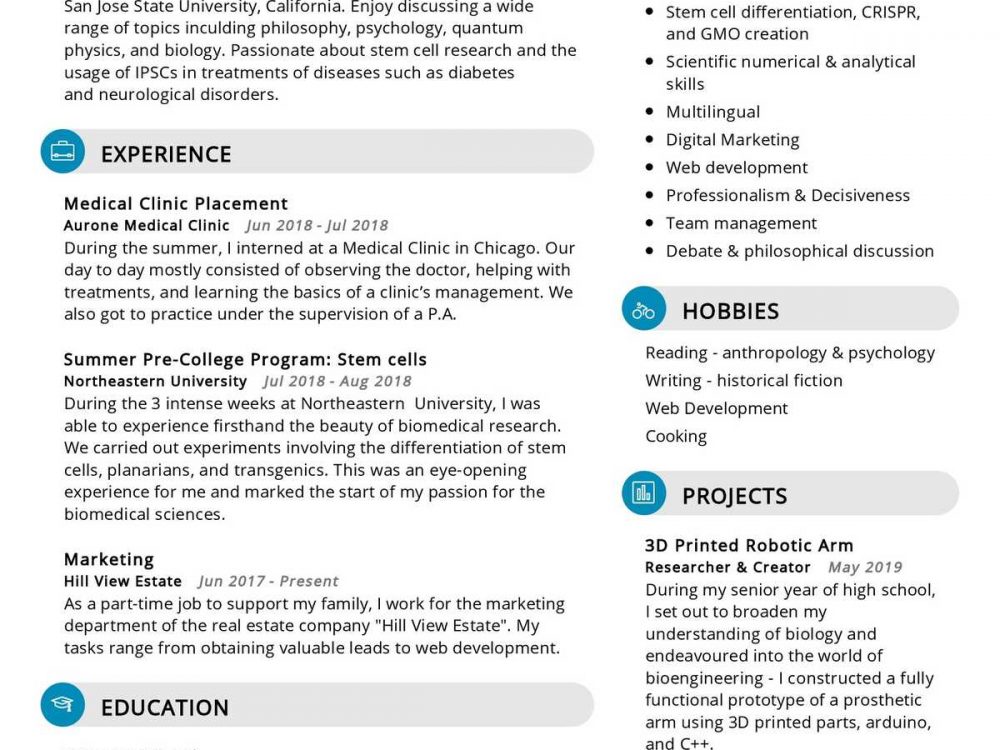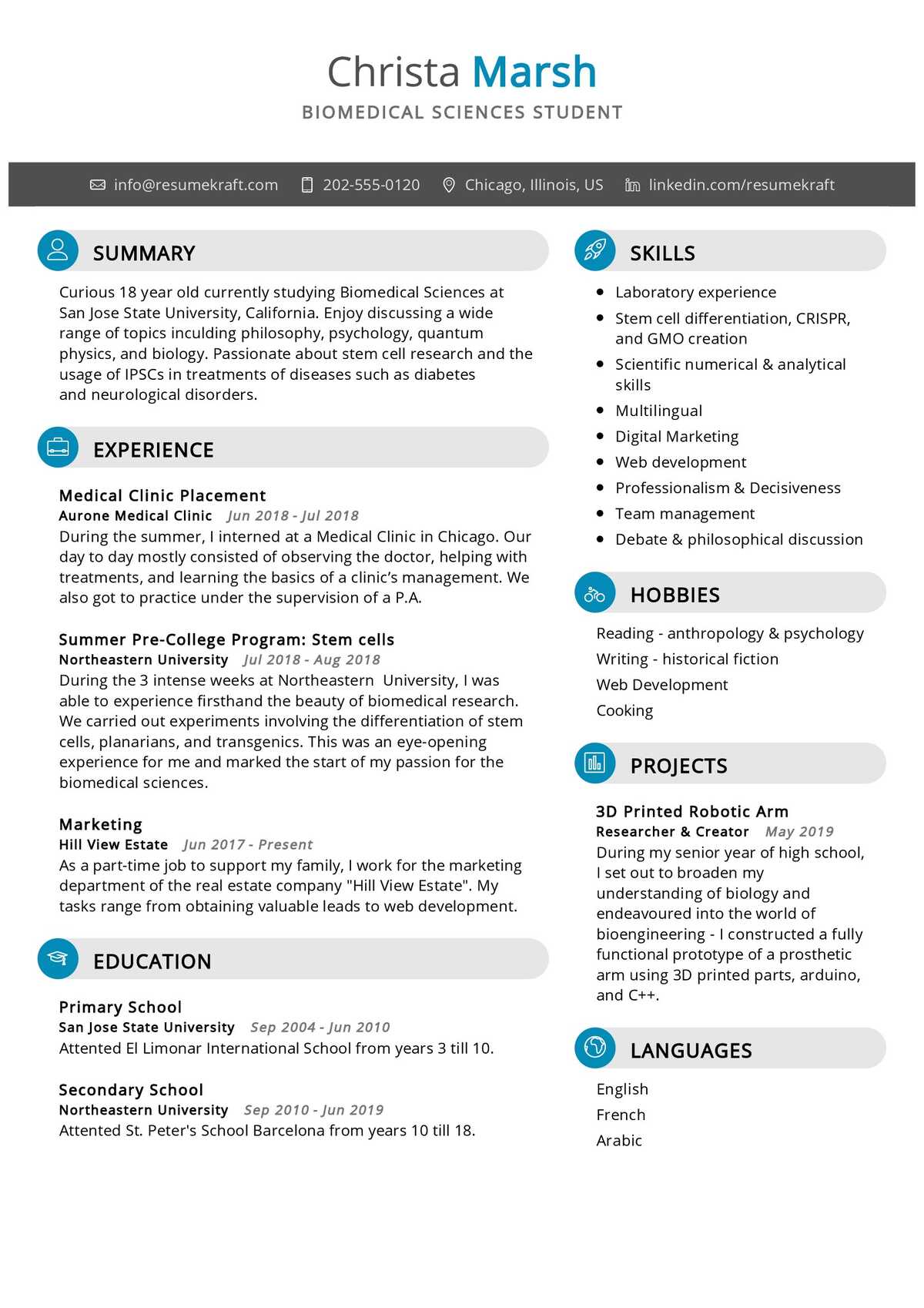Are you a Biomedical Sciences Student and looking for an internship? We have good news for you! use our professional Biomedical Sciences Student Resume Sample. You don’t have to start writing from scratch. Just click “Edit Resume” and modify it with your details. Update the template fonts and colors to have the best chance of landing your dream job. Find more resume samples.
Career Expert Tips:
- Always make sure you choose the perfect resume format to suit your professional experience.
- Ensure that you know how to write a resume in a way that highlights your competencies.
- Check the expert curated popular good CV and resume examples
Best Guide to Write a Biomedical Science Resume
Are you looking to land your dream Biomedical Science job? To do that, you need to show hiring managers who you are. Crafting a strong and compelling resume can help get the attention of recruiters and hiring managers. In order to create an effective resume for this position, review the following suggestions:
The best practices on how to write a Biomedical Science Resume:
- Provide relevant experience and education. This is your opportunity to highlight the work experience that makes you an ideal candidate for this role. Highlight your communication skills, problem-solving abilities, and teamwork ethic that prove to be an asset in a leadership role or high-stress environment.
- Target the resume to the position you are applying for. Tailor your resume so it meets the specific qualifications of the job posting. A generic one just won’t do. Show hiring managers that you have what they are looking for and why you are different from other applicants.
- Use a clear and easy to follow format. Hiring managers will be scanning your resume for the necessary information, so make sure they can find it easily. Don’t use difficult fonts, colors, or sidebars. Keep the layout simple and clean so that it doesn’t distract from your key strengths and qualifications.
- No typos or grammatical errors. These could be detracting from the overall impression you are trying to make. If English is not your native language, have someone else proofread to avoid mistakes.
- Make sure the contact information is accurate and easy to locate. This includes a professional email address with an easy to remember name, as well as a current phone number. Use both a landline and a cell phone so that you can reach you 24/7 if necessary.
- Keep it concise and targeted to the position. There is no need to include irrelevant personal information such as hobbies and family information.
- Ensure that you are applying for the correct position. Make sure to have a solid understanding of the requirements for the role and that it matches your own qualifications. If it does not, it may be best to reevaluate your candidacy for this position or explore other opportunities.
- Go beyond the basics. By showing that you are capable of meeting challenges, providing results, and increasing productivity, you will give hiring managers confidence that you are the perfect fit for this job.
Biomedical Science Key Responsibilities:
- Develop, implement and maintain laboratory animal care protocols.
- Lead and inspire your team to ensure that animals are cared for in a comfortable and humane manner.
- Maintain positive relationships with animal owners in order to promote the ethical use of animals.
- Use technical skills, knowledge, and experience to provide confidential care for laboratory animals by assessing their physical, emotional, and social needs as well as providing therapy, training, nutrition, etc…
- Demonstrate excellence in customer service.
- Communicate effectively with animal owners, staff, and other stakeholders to create a positive experience for those involved in the care of laboratory animals.
Biomedical Science Resume Summary:
The Biomedical Science Resume summary section is meant to be a short overview of your work experience, skills, and accomplishments. This section should be placed immediately after your contact information but before your Education section.
Summary example:
“Analyzes, designs, and collects data to support research projects. Designs experiments to measure gene expression. Trains users on various laboratory equipment. Oversees and conducts experiment development.”
“I am a highly-skilled Biomedical Science candidate who has a passion for science and research. My interest in biology paired with my experience in lab research, prove that I can be a valuable asset to your company.”
Biomedical Science Education Qualification:
The Education section is where you list your educational background including all colleges and universities you have attended as a student, the degrees received, when they were received, and any honors or awards you may have seen along the way. This section should be placed after but still before your Biomedical Science Resume Skills section.
Top 10 Biomedical Science Skills:
- Research Skills: This section is where you list your research experience including research mentor, study design, and the type of research project you worked on.
Example
“Trained spinal cord injury patients in various laboratory equipment and techniques.” - Laboratory and Data Management Skills: You will need to be organized, detail-oriented, a great planner, and good at math when writing this section. This section also requires the ability to organize different types of data while corresponding with lab technicians. You will need to be able to read, interpret, and explain research data within your experiments.
- Equipment Skills: Qualifications in working with different laboratory equipment is always a plus when applying for a job. This section will help you separate yourself from other Biomedical Science Resume applicants because it allows you to highlight the skills that employers are looking for.
- Software Skills: Use this section to show experience in developing software and familiarizing yourself with programming languages, databases, and statistical programs needed in industry research environments.
- Writing Skills: This section shows your ability to write well. You will need to use correct grammar, punctuation, and persuasive wording when writing.
- Project Management Skills: If a researcher needs more than one person to work on a project, this section is where you can show that you can organize and manage the time of other researchers as well as yourself.
- Research Expertise: If you have published your own journal articles, this is the section where you can list them and explain how they helped to shape your career as a scientist. This section is also good for listing any awards you may have seen.
- Communication Skills
- Data Analysis Skills: This section shows that you have the ability to interpret, identify, analyze, and use data properly to solve issues in a research lab.
- Presentation Skills: Presenting your research projects to other researchers, creating posters, and attending research conferences is a good way to show your critical thinking skills.
These are only the basics of what you need to put in this section. The goal is to leave no needs unmet for potential employers. By working with an experienced resume writer, they will be able to expand this section and include specialized skills that can help set you apart from other scientists in the field.
Tips to write a Biomedical Science Resume Cover Letter:
- Start out by stating your name, address, and telephone number.
- State your reasons for applying to this particular organization.
- Target the skills you have that are needed in their field.
- Highlight the skills that are different than those of their resume competition.
- Keep your letter short but direct so it gets to the point.
- Don’t waste your time trying to make your cover letter sound smarter than it is.
- End by thanking the employer for reviewing your resume.
Key Takeaways:
- Format your resume according to the guidelines set down by the National Institutes of Health (NIH) and the American Society for Biochemistry and Molecular Biology (ASBMB).
- Use a career summary covering your education, experience, skills, duties, awards, and honors.
- Include degrees and certifications if they contribute to your abilities/qualifications.
- Consider domestic volunteer work as part of your experience.


